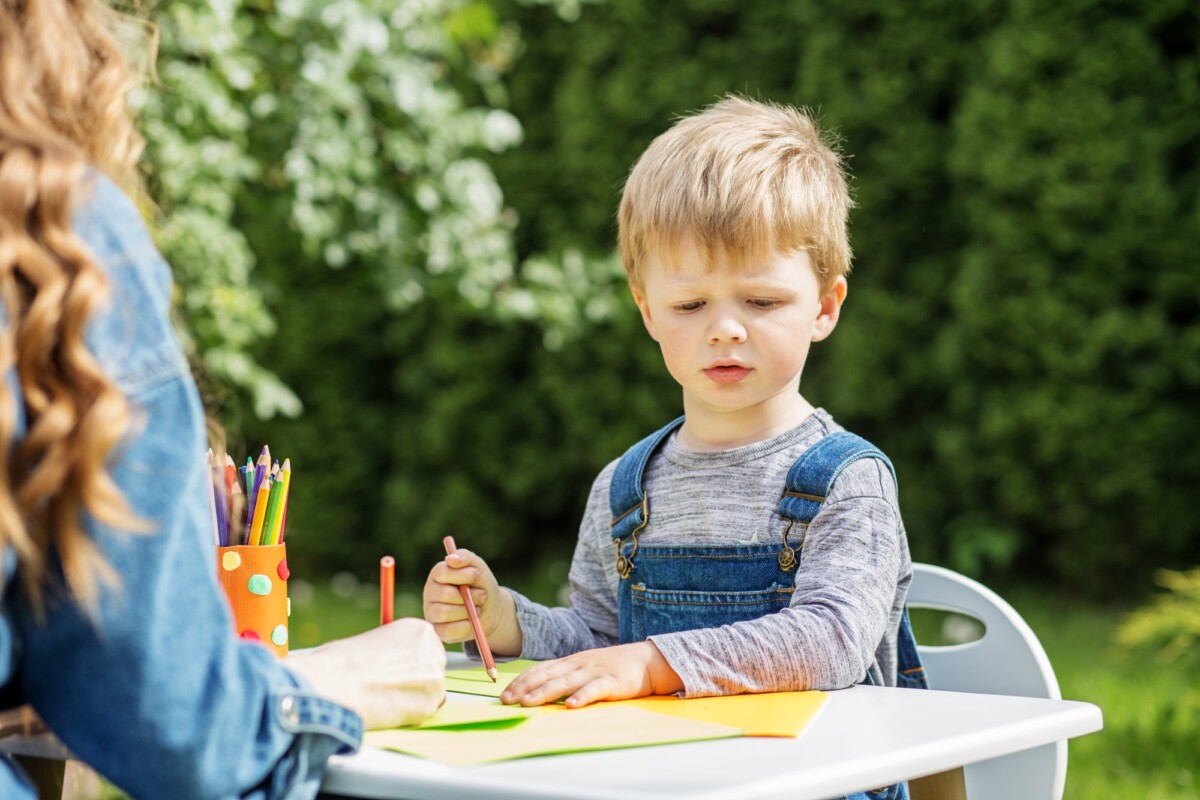Early Childhood Literacy is more than just a stepping stone; it’s the foundation upon which lifelong success is built. From the moment a child is born, their brain is like a sponge, absorbing information and experiences. Early Childhood Education plays a crucial role in nurturing this development, setting the stage for future learning and achievement.
The Building Blocks of Literacy
Understanding the basics of language and communication early on can significantly impact a child’s ability to succeed academically and socially. Early Literacy Tips for Parents include reading aloud to children, engaging them in conversations, and introducing them to books and stories. These activities not only enhance vocabulary but also foster a love for learning.
Benefits of Early Literacy
- Cognitive Development: Engaging in literacy activities stimulates brain development, improving memory and problem-solving skills.
- Social Skills: Literacy encourages interaction, helping children learn to express themselves and understand others.
- Academic Success: Children who develop literacy skills early are more likely to excel in school and beyond.
By focusing on Early Childhood Literacy, parents and educators can provide children with the tools they need to thrive in all areas of life. It’s a small investment with lifelong returns.
Contact Now to Pursue Your Dream Degree From Your Nearest College
The Cognitive Benefits of Early Childhood Literacy
Early Childhood Literacy is crucial for lifelong success, serving as the foundation for cognitive development and personal growth. By integrating literacy activities into Early Childhood Education, children develop essential skills like critical thinking and problem-solving, which are vital for academic and personal achievements.
Enhanced Brain Development
Engaging young minds in reading and storytelling stimulates brain development, particularly in language and comprehension areas. This early exposure activates neural pathways that support language acquisition, laying the groundwork for advanced literacy skills and academic excellence.
Building a Strong Vocabulary
A robust vocabulary is essential for effective communication and academic success. Early Literacy Tips for Parents, such as reading aloud and discussing stories, help children build vocabulary, boosting their confidence in expressing ideas and understanding complex concepts.
- Read Aloud Regularly: Introduce diverse books to broaden vocabulary.
- Interactive Storytelling: Encourage questions and predictions.
- Discuss New Words: Explain meanings and contexts.
Fostering a Love for Learning
Instilling a love for reading nurtures a lifelong passion for learning. Literacy-focused Early Childhood Education encourages curiosity and imagination, essential for innovative thinking. By fostering a positive reading environment, parents inspire children to explore new ideas, setting them on a path to success.
Read Also: The Difference Between Regional and National Accreditation?
How Reading Skills Influence Social and Emotional Development
Early childhood literacy is more than just a stepping stone to academic success; it’s a crucial element in shaping a child’s social and emotional development. By fostering early literacy skills, children gain the ability to express themselves, understand others, and navigate social interactions more effectively. This foundation not only supports their educational journey but also enhances their emotional intelligence and interpersonal skills.
Building Empathy and Understanding
Reading stories allows children to step into the shoes of different characters, fostering empathy and understanding. Through early childhood literacy, children learn to recognize and respect diverse perspectives, which is essential for developing strong social connections.
Enhancing Communication Skills
Early childhood education emphasizes the importance of reading as a tool for improving communication. As children engage with books, they expand their vocabulary and learn to articulate their thoughts and feelings more clearly. These skills are vital for effective social interactions and emotional expression.
Boosting Confidence and Self-Esteem
Early literacy tips for parents often highlight the role of reading in boosting a child’s confidence. When children successfully read and comprehend stories, they experience a sense of achievement that enhances their self-esteem. This confidence translates into more positive social interactions and a willingness to engage with peers.
What Role Do Parents and Educators Play in Early Literacy?
Early childhood literacy is fundamental to a child’s educational journey, laying the groundwork for lifelong learning and success. It involves the acquisition of skills and knowledge before formal reading and writing, forming the basis for future academic achievements. By nurturing a love for reading early on, children are more likely to excel in school and beyond.
Parents and educators play crucial roles in fostering early childhood literacy by creating supportive environments that encourage language exploration. Parents, as a child’s first teachers, can seamlessly integrate literacy into daily routines through activities like reading bedtime stories or discussing book illustrations, sparking imagination and curiosity.
Educators in early childhood education settings enhance these foundational skills with structured learning experiences. They introduce diverse texts and literacy activities, creating an engaging and interactive learning atmosphere. Educators also collaborate with parents, providing early literacy tips for parents to extend learning at home, ensuring a consistent and enriching literacy experience.
Together, parents and educators establish a robust foundation for early childhood literacy, equipping children with essential skills for academic and life success. Their joint efforts help children develop critical thinking, communication, and problem-solving abilities, crucial for navigating the complexities of today’s world.
The Impact of Early Childhood Literacy on Academic Achievement
Early childhood literacy is a cornerstone of academic success, setting the stage for a lifetime of learning and achievement. When children are exposed to reading and writing at a young age, they develop essential skills that support their educational journey. Early childhood education plays a crucial role in this process, providing the tools and environment necessary for young minds to flourish.
Building Blocks of Literacy
Understanding the building blocks of literacy is vital for parents and educators. Early literacy tips for parents include reading aloud to children, encouraging storytelling, and introducing a variety of books. These activities not only enhance vocabulary but also stimulate cognitive development, fostering a love for learning that can last a lifetime.
Long-term Academic Benefits
The benefits of early childhood literacy extend far beyond the preschool years. Children who engage in early literacy activities often perform better in school, showing improved reading comprehension and critical thinking skills. This foundation paves the way for academic achievement, enabling students to tackle complex subjects with confidence and curiosity. By investing in early childhood education, parents and educators can set children on a path to success.
Contact Now to Pursue Your Dream Degree From Your Nearest College
Innovative Strategies to Foster Early Childhood Literacy
Early childhood literacy is crucial for building a foundation for lifelong success, equipping children with essential skills for academic and personal growth. Early childhood education plays a vital role in this development, and parents can enhance this process through strategic involvement.
Creating a literacy-rich environment is one effective strategy. By surrounding children with books and engaging in storytelling sessions, parents can enhance vocabulary and foster a love for reading. Early literacy tips for parents include setting up a cozy reading nook and making regular library visits to explore new books.
Interactive reading further supports literacy development by encouraging children to ask questions and express their thoughts about stories. This engagement promotes critical thinking and comprehension. Using expressive voices and gestures during reading sessions can make the experience more engaging and help children connect with the material.
Incorporating literacy into daily activities also boosts early childhood literacy. Labeling household items, playing word games, and “reading” recipes during cooking are practical ways to make learning fun and integrate literacy into everyday life. These strategies help parents lay a strong foundation for their child’s future success.
Read Also: Where Can You Find a Free AI Language Tutor?
How CollegeDegree.Education Supports Early Childhood Literacy Initiatives
Early childhood literacy is essential for lifelong success, forming the basis for academic and personal growth. By nurturing a love for reading early on, children enhance their critical thinking and vocabulary, setting a strong foundation for future learning. CollegeDegree.Education is dedicated to supporting initiatives that empower young learners and their families.
Why Early Childhood Literacy Matters
- Cognitive Development: Stimulates brain growth, enhancing problem-solving and comprehension skills.
- Language Skills: Expands vocabulary and improves communication through engaging with books.
- Academic Success: Early literacy skills lead to better school performance.
Early Literacy Tips for Parents
Parents are crucial in fostering early literacy. Here are some tips:
- Read Aloud Daily: Establish a daily reading routine.
- Create a Reading-Friendly Environment: Provide age-appropriate books.
- Encourage Storytelling: Inspire creativity by having children tell or retell stories.
CollegeDegree.Education champions the transformative power of early childhood education. By backing literacy initiatives, we aim to equip parents and educators with the tools needed to inspire young minds and guide them towards success.
Overcoming Challenges in Early Childhood Literacy Development
Early Childhood Literacy is a crucial stepping stone in a child’s educational journey, laying the groundwork for future academic and personal success. However, navigating the path to literacy can present challenges that require thoughtful strategies and support. By understanding these challenges, parents and educators can better foster a love for reading and learning in young children.
Identifying Common Barriers
Children may face various obstacles in Early Childhood Education, such as limited access to books, language barriers, or learning disabilities. Recognizing these hurdles early on is essential for providing targeted support. Early Literacy Tips for Parents include creating a rich literacy environment at home and engaging in regular reading activities to overcome these barriers.
Strategies for Success
- Create a Reading Routine: Establish a daily reading habit to build familiarity and comfort with books.
- Interactive Storytelling: Use expressive voices and gestures to make stories come alive.
- Encourage Questions: Foster curiosity by inviting children to ask questions about the story.
By addressing these challenges with proactive strategies, parents and educators can significantly enhance a child’s literacy skills, setting a strong foundation for lifelong learning and success.
Contact Now to Pursue Your Dream Degree From Your Nearest College
FAQs
-
What is early childhood literacy?
Early childhood literacy refers to the skills and knowledge that children develop before they can read or write, such as recognizing letters, understanding sounds, and developing vocabulary. -
Why is early literacy important?
Early literacy skills lay the foundation for future reading, writing, and overall academic success. Strong literacy skills also support cognitive and social development. -
At what age should I start teaching my child literacy skills?
You can start from birth by talking, singing, and reading to your child. Literacy development begins with listening and recognizing sounds before learning to read and write. -
How do young children learn to read and write?
They start by listening to language, recognizing sounds, looking at pictures, scribbling, and eventually associating letters with sounds to form words.


